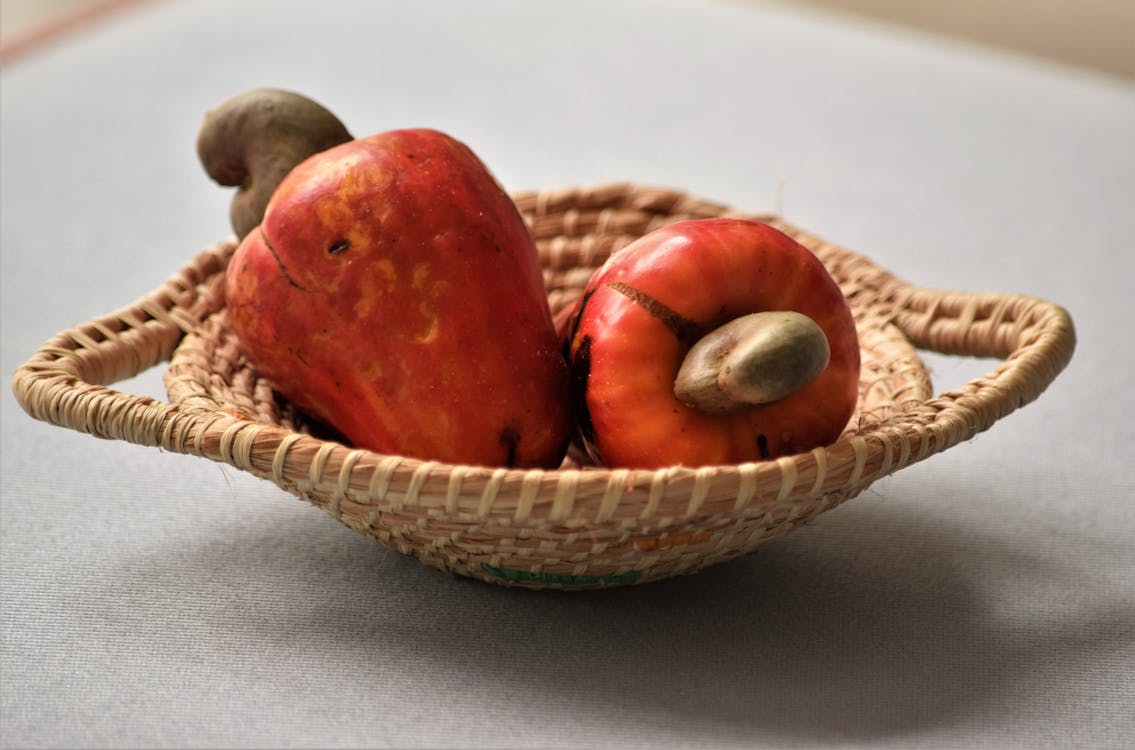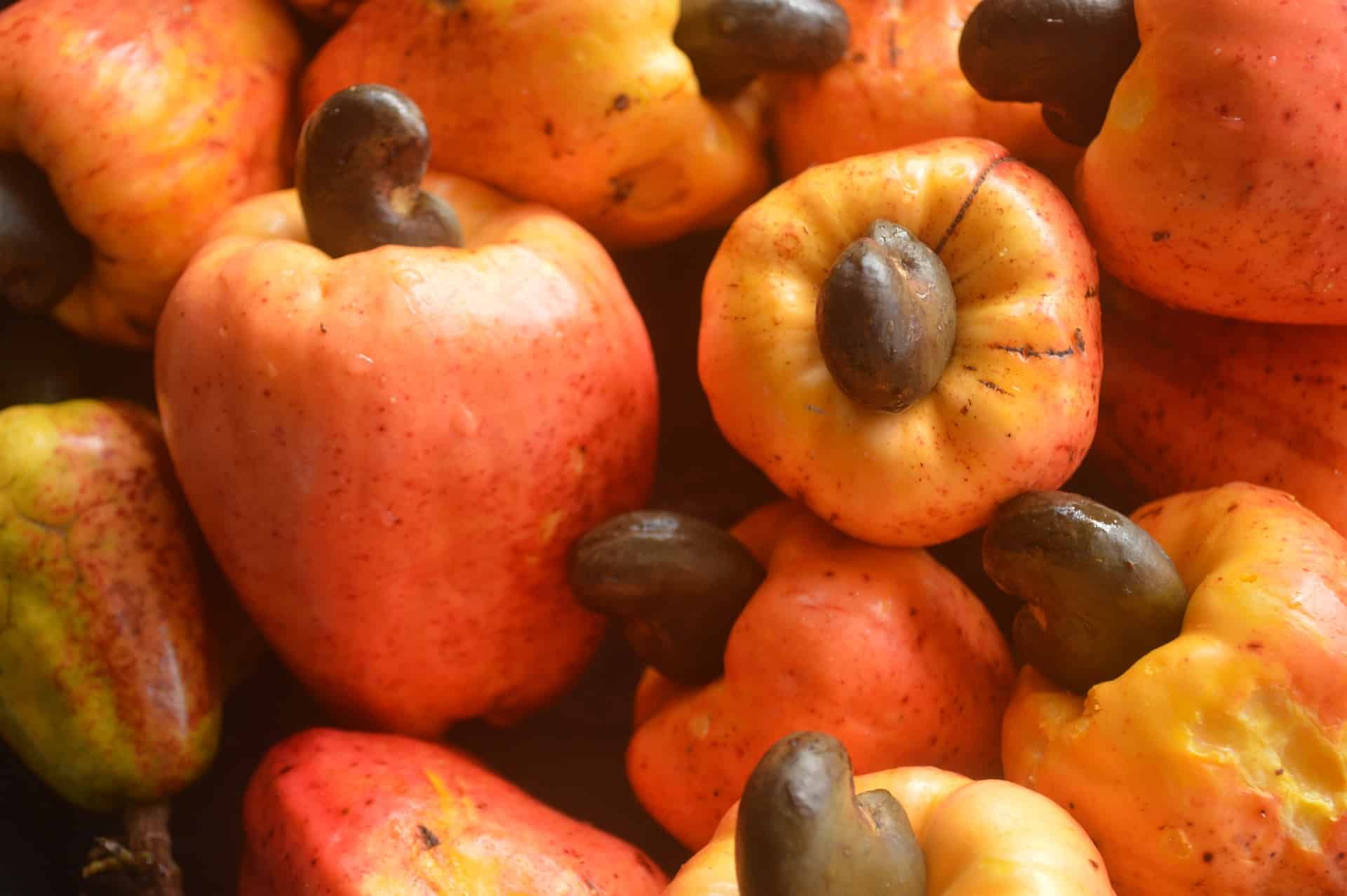Updated on November 11th, 2022
The cashew apple is a tropical fruit with a tart, sweet taste, and it is often blended with other tropical fruit. It is a good source of magnesium, potassium, iron, copper, and fiber and contains 250 milligrams of vitamin C in just half a cup of juice. It has flesh that is spongy and fibrous. Once bitten into, its texture becomes more watery and reminiscent of an ice cream bean.

The fruit of the cashew tree resembles a pear, and the seeds are edible and widely used in many foods and beverage preparations. In addition to being a delicious snack, it is also an excellent ingredient in drinks and beverages. While cashew apples may be bitter when raw, you can cook them with other fruit and vegetable products to reduce their bitter taste.
What Is A Cashew Apple?
The cashew apple is a fruit that grows on the cashew tree. The fruit has a thin, shiny skin that turns green or yellow, or orange when ripe. It is perishable and comes in green, yellow, and orange varieties. It is used as a vegetable and is rich in vitamins and minerals. Known as a pear-shaped fruit, cashew is an exotic fruit from Brazil. The cashew apple is a tropical fruit that grows in India.
The cashew apple is commonly referred to as cashew fruit. The cashew tree produces the cashew nut and an accessory fruit called the cashew apple. It grows as tall as 14 meters, but dwarf cultivars can grow to six feet or lower and have higher yields. Once mature, cashew apples have a short shelf life and are a delicious, fleshy treat. When you’re eating a cashew apple, it has a slightly sweet taste and a rich, creamy texture.
What Does A Cashew Apple Taste Like?
They have a slightly acidic taste, making them a tasty and nutritious snack. It is a tropical fruit with a citrus-like flavor, and its flesh is pulpy and juicy and has an astringent flavor.
Its flavor is slightly astringent and causes irritation to the throat and tongue. The taste of cashew apples can vary depending on the variety. The flavor of a cashew apple is sweet with a rich mix of other flavors. With a tropical, fruity aroma, the yellow flesh has traces of strawberry, mango, cucumber, cashew nuts, and bell peppers. Cashew apples have a distinctive feel that is spongy, creamy, fibrous, and juicy. Although there doesn’t appear to be much juice, the texture of the pulp changes as you chew it. This is something we noticed in the ice cream bean as well.
Are Cashew Apples Healthy?
Promotes Muscle And Nerve Health
Cashew is necessary not just for bone health but also for the tissues, muscles, and other body organs.
Can Aid in Cancer Prevention
Proanthocyanins, a type of flavonol found in cashews, are a type of flavonol that inhibits cancer cell reproduction. This is a critical function because once cancer cell replication begins, it becomes difficult to stop, which is why a shotgun strategy is sometimes used to treat cancer, causing harm to healthy cells in the process. Cashews are also high in copper, a mineral that inhibits cell mutation, and have shown promise in treating and preventing colon cancer.
Immune System Booster
As a vitamin powerhouse, this fruit aids the body’s fight against anti-bacterial infections by enhancing the immune system’s strength. The inclusion of zinc and antioxidants in cashew aids in the strengthening of your immune system. As a result, regular cashew consumption helps to keep you healthy and ensures quick healing owing to a more robust immune system.
Encourages a healthy heart
Although cashews are high in fat, they are not high in the often unhealthy type. Instead, it boosts the creation of fatty acids, which are necessary for brain development and blood coagulation.
Cashew eating regularly helps to lower cholesterol and regulate blood pressure.
These Home Remedies Can Help You Get Relief From Various Pains Without Using Medicines
Promotes Eye Health
It is a good diet for the eyes because of its high levels of lutein and zeaxanthin. They are beneficial in promoting healthy eyes and preventing damage to your eyes from dangerous sun rays, as well as lowering the risk of cataracts.
Anemia is avoided by taking this supplement.
Cashew fruits are high in dietary iron, which is necessary for transporting oxygen throughout the body and supporting the immune system and enzyme activity. Iron deficiency can cause various health problems, including anemia, increased susceptibility to infection, weariness, and an increased risk of being ill. Due to the presence of iron in cashews, eating them helps prevent health problems.
It Assists With Weight Loss
When done in moderation and regularly, Cashew eating helps lower cholesterol in the heart and fat buildup, resulting in weight loss. They contain a high dietary fiber content and a high-calorie density, necessary for weight loss when consumed in moderation.
Promotes Skin Health
Copper is a mineral engaged in the maintenance of collagen and elastin. While vitamin C boosts collagen synthesis in the body, copper is a mineral involved in maintaining collagen and elastin. This is significant because a lack of this mineral can cause early skin sagging. Consume vitamin C-rich foods, such as cashew fruits to maintain youthful skin.
Are Cashew Apples Poisonous?
Many people are unaware that cashews contain a toxin called urushiol, which can be deadly if consumed in certain circumstances.
Cashew apples are harvested, which are edible but exceedingly perishable.
Depending on the manufacturer’s technique, the cashew nuts are plucked from the ends of the fruits while still in their shells and dried in the sun. Because of the potential of urushiol exposure, these cashews are raw and not for sale.
- Cashews, mango, poison ivy, poison oak, sumac, Peruvian peppers, and pistachios are all the Anacardiaceae family of plants containing urushiol.
- While urushiol can be found in various parts of the plant, including the roots, stems, and leaves, it is most commonly found in the oil between the cashew shell and the nut inside.
- When you encounter urushiol, you’re likely to have allergic contact dermatitis, a delayed skin rash in people who look like poison ivy.
- In an older animal study, rats were given varying amounts of cashew nutshell extract, which caused licking, scratching, tremors, heightened pain sensitivity, mucus discharges, passive behavior, and even death.
- The type and severity of your reaction may be determined by the amount of urushiol you were exposed to, as well as whether you drank it or had direct skin contact with it.
- While urushiol can be found in various parts of the plant, including the roots, stems, and leaves, it is most commonly found in the oil between the cashew shell and the nut inside.
- When you encounter urushiol, you’re likely to have allergic contact dermatitis, a delayed skin rash in people who look like poison ivy.
- An urushiol-induced skin rash shows as itchy, inflamed lumps or patches on the skin that may secrete and even cause a severe burning sensation or localized swelling.
How Can A Cashew Apple Be Consumed?
People have grown increasingly inventive in applying the cashew apple over time. This fruit is used to make a variety of goods, including:
- Alcoholic beverages: In India, feni is a fermented drink made from juice and pulp. The liquid is distilled several times, resulting in a solid alcoholic beverage. This method traditionally entails stomping the apple with bare feet to extract as much juice and pulp as possible. Other civilizations, such as those in Mozambique and Tanzania, use the fruit to make alcoholic beverages.
- Apples are an excellent choice for creating vinegar, marinating, and pickle.
- Jam and syrup: The pulp and juice of the fruit are used to make jams, spreads, and syrups. It’s a delicious treat to boil it down and mix it with a sweetener.
- Juice: You can sweeten freshly squeezed juice by mixing it with sugar or other fruit liquids or incorporating it into a smoothie.
- Sweet curries and stews: The fruit’s sweetness complements the curry’s aromatic solid notes of cinnamon and turmeric. The fruit is dense enough to retain a pleasant bite after cooking.
Conclusion
The cashew apple is not an apple but rather a false fruit, and it is a swollen stem and is a nut with smooth, shiny skin.
The cashew is the most commonly used nut in the world. A tropical evergreen tree produces cashew seeds and an accessory fruit called the cashew apple. It can grow as tall as 14 meters, but dwarf cultivars can be much smaller and yield higher. The ripe cashew apple is usually red or yellow and can be eaten raw or cooked, and its high concentration of Vitamin C makes it an excellent choice for cooking and baking.
The cashew apple is very popular amongst the native populations of West Africa. The cashew apple is available fresh and is harvested in most parts of the world. The fruit is usually three times as large as almond and has waxy skin. Its sweet, nutty flavor is easily distinguishable from other nut butter. It is a good snack that has numerous health benefits.
